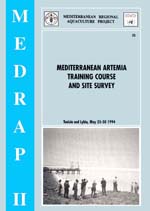
Tunisia and Libya, May 25–30 1994
MEDRAP II
RAB/89/005-RER/87/009
FIELD DOCUMENT
94/33
 | MEDITERRANEAN ARTEMIA, TRAINING COURSE AND SITE SURVEY Tunisia and Libya, May 25–30 1994 |
Edited by MEDRAP II Regional Center
Tunis - Tunisia
All rights reserved. No part of this publication may be reproduced, stored in a retrieval system, or transmitted in any form or by any means, electronic, mechanical, photocopying or otherwise, without the prior permission of the copyright owner. Applications for such permission, with a statement of the purpose and extent of the reproduction, should be addressed tot he Director, Publications division, Food and Agriculture Organisation of the United Nations, Viale delle Terme di Caracalla, 00100 Rome, Italy.
Preparation of this Document
This document is one of a series of documents prepared during the course of the Project identified in the title page. The conclusions and recommendations given were considered appropriate at the time it was prepared. They may be modified in the light of further knowledge gained at subsequent stages of the Project.
The designations employed and the presentation of the material in this document do not imply the expression of any opinion whatsoever on the part of the Food and Agriculture Organisation of the United Nations concerning the legal status of any country, territory, city or area or of its authorities, or concerning the delimitation of its frontiers or boundaries.
The opinions expressed by the Authors in this document are not necessarily those of FAO or the Governments of the participating contries.
This document was edited by Hassen AKROUT and Mohieddine BELKHIR in collaboration with Othman BÉJI and Neila KAFFEL, the revision was made by Michel LAMBŒUF.
Abstract
The Training course on Sites surveys on Mediterranean Artemia was organised from 25 to 30 May in Tunisia and Libya.
The objective was to update participants with biology, ecology and production of artemia.
Better exchange between participants of Mediterranean coutries was facilitated, this should be continued and cooperation reinforced. The production of artemia could contribute to food security in the region in the long term, a complete inventory of the possibilities and a development of technical capabilities is required.
Acknowledgements
The Editor would like to thank the Tunisian and Libyan authorities, for their support to the organisation of this activity. Thanks are also addressed to the participants from Member/Associated countries who accepted to contribute to the workshop.
Note from the reviser
The revision and publication of this document could only be done a long time after the closure of the project. This has led to some difficulties in finalising the documents and implementing corrections, because authors and contributors as well as some of the original material or files were no longer available.
Therefore contributions from participants and session papers annexed to most of the documents were left in their original form. No language corrections were introduced, the content was not modified and left under their respective authors' responsibility.
Considering the above, we hope that the reader will understand that a standard of publication could not e maintained on a level as high as we would have liked it to be.
United Nations Development Programme

Food and Agriculture Organisation of the United Nations

Hyperlinks to non-FAO Internet sites do not imply any official endorsement of or responsibility for the opinions, ideas, data or products presented at these locations, or guarantee the validity of the information provided. The sole purpose of links to non-FAO sites is to indicate further information available on related topics.
This electronic document has been scanned using optical character recognition (OCR) software. FAO declines all responsibility for any discrepancies that may exist between the present document and its original printed version.
• L'Artemia en Tunisie,
By Néji Aloui
• Potentiel d'Artemia en Tunisie,
By B. Missaoui and N. Abdelkader
• Artemia production case study in Egypt,
By S. Ghoneim
• Geografical distribution of Artemia in the Jamahiriya,
By M.O. Magsodi
• Situation de L'Artemia au Liban,
By M.A. Abi Saad
• Sur L'Artemia Marocaine,
By M.H. Amane
• Artemia statement in Turkey,
By N. Gokgoz
• Sur L'Artemia Algérienne,
By I. Samia
• Les salines, sebkhas, chotts et l'Artemia en Tunisie
By M.S. Romdhane
• Artemia production case study in Tunisia,
By M. Belkhir
• Artemia production in Egypt,
By M.A.S.D. Ahmed
• The cosmopolitan brine shrimp
By G.V. Stappen and P. Sorgeloos
• Morphological characterisation of adult Artemia from different geographical
origin in the Mediterranean populations
By F. Hontoria and F. Amat
• Further characterisation of two Artemia populations from Northern Greece:
biometry, hatching characteristics, caloric content and fatty acid profiles
By T. Abatzopoulos, G. Karamanlidis, P. Léger and P. Sorgeloos
• Lipid composition of cysts of the brine shrimp Artemia sp. from spanish
populations.
By J.C. Navarro, F. Amat and J.R. Sargent
• International Study on Artemia IX. Lipid level, energy content and fatty acid
composition of the cysts and newly hatched nauplii from five geographical
strains of Artemia
By Paul S. Schauer, D. Michael Johns, Charles E. Olney, and Kenneth,
L. Simpson U S A
• International Study on Artemia*. XXVI. Food Value of Nauplii from Reference
Artemia Cysts and Four Geographical Collections of Artemia for Mud Crab Larvae
By C.R. Seidel, D.M. Johns, P.S. Schauer and C.E. Olney
• Overview genetics of mediterranean bisexual Artemia.
By E.J.S. Pilla
• The nutritional value of Artemia
By P. Leger, D.A. Bengtson, P. Sorgeloos, K.L. Simpson and A.D. Beek
• Improved larviculture outputs of marine Fish shrimp and prawn
By P. Sorgeloos and PH. Léger
• The use of brine shrimp Artemia in biological management of solar saltworks
By W. Tackaert and P. Sorgeloos
• Semi Intensive culturing in fertilised ponds
By W. Tackaert and P. Sorgeloos